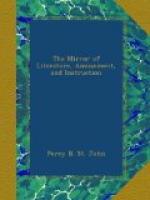PORTRAIT PAINTING.
The good portrait painter always flatters; for it is his business, not, indeed, to alter and amend features, complexion, or mien, but to select and fix (which it demands genius and sense to do) the best appearance which these ever do wear. Happy the creature of sense and passion who has always with him that self which he could take pleasure in contemplating! Happy—to pass graver considerations—the fair one whose countenance continues as youthful as her attire! When Queen Elizabeth’s wrinkles waxed deep and many, it is reported that an unfortunate master of the mint incurred disgrace by a too faithful shilling; the die was broken, and only one mutilated impression is now in existence. Her maids of honour took the hint, and were thenceforth careful that no fragment of looking-glass should remain in any room of the palace. In fact, the lion-hearted lady had not heart to look herself in the face for the last twenty years of her life; but we nowhere learn that she quarrelled with Holbein’s portraitures of her youth, or those of her stately prime of viraginity by De Heere and Zucchero.
He who has “neither done things worthy to be written, nor written things worthy to be read,” takes the trouble of transmitting his portrait to posterity to very little purpose. If the picture be a bad one, it will soon find its way to the garret; if good, as a work of art, it will perpetuate the fame, probably the name, indeed, of the artist alone. These are the obscurorum virorum imagines which, as Walpole said, “are christened commonly in galleries, like children at the Foundling Hospital, by chance”—Q. Rev.
* * * * *
LOSING A SHOE AND A DINNER.
As Ozias Linley, Sheridan’s brother-in-law, was one morning setting out on horseback for his curacy, a few miles from Norwich, his horse threw off one of his shoes. A lady, who observed the accident, thought it might impede Mr. Linley’s journey, and seeing that he himself was unconscious of it, politely reminded him that one of his horse’s shoes had just come off. “Thank you, madam,” replied Linley; “will you then have the goodness to put it on for me?”
Linley one day received a card to dine with the late archbishop of Canterbury, who was then bishop of Norwich. Careless into what hole or corner he threw his invitations, he soon lost sight of the card, and forgot it altogether. A year revolved, when, on wiping the dust from some papers he had stuck on the glass over the chimney, the bishop’s invitation for a certain day in the month (he did not think of the year one instant,) stared him full in the face, and taking it for granted that it was a recent one, he dressed himself on the appointed day, and proceeded to the palace. But his diocesan was not in London, a circumstance of which, though a matter of some notoriety to the clergy of the diocese, he was quite unconscious; and he returned dinnerless home.




